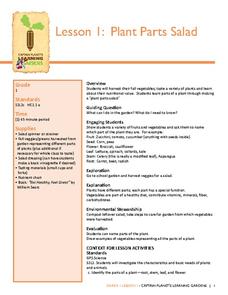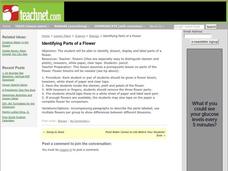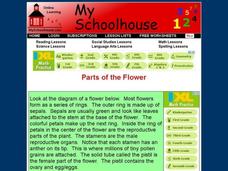Curated OER
Flower Power
In this science worksheet, young scholars learn the basic anatomy of a flower and how a flower reproduces by completing this flower dissection activity. Students follow detailed instructions on how to dissect the flower. Young scholars...
Garden Earth Naturalist Club
Parts of a Flower! Flower Dissection
Sometimes the best way to learn about plants is to see the different parts of a plant yourself. Groups of learners dissect flowers to answer questions about what they observe and what they wonder about their flower.
Primary Resources
Science - The Parts of a Flower
Here is what a PowerPoint presentation should look like! This excellent show lets students know what they will be learning about, takes them through nicely-designed examples, leaves room for discussion questions, has a built-in activity,...
Curated OER
Flower Dissection
In this science worksheet, students follow directions for dissecting a flower. Students tape the parts of the flower in the corresponding boxes. Students also read about how flowers reproduce and analyze a related diagram.
Curated OER
6: Parts of a Flower
Students draw and label the parts of a flower using a coin from the Northern Mariana Islands. For this flower parts lesson, students look at a transparency of the reverse side of a quarter from the Mariana lslands. They discuss the...
Curated OER
Parts of the Flower and Pollination
Students review the parts of the plant and recognize the parts that are important for pollination. For this pollination lesson, students illustrate and label the parts of a flower. Students compare different types of flowers.
Captain Planet Foundation
Plant Parts Salad
How are vegetables beneficial to a healthy diet? Have kids examine different types of vegetables, such as zucchini, broccoli, and carrots, and determine which parts of the plant they represent. Then, they taste the vegetables as a class....
The Science Spot
Flower Basics
Learn about plants and pollination with a learning exercise about the parts of a flower. After labeling the anatomy of a flower using a word bank, kids explain the difference between self-pollination and cross-pollination, and unscramble...
Curated OER
Sponge Painting Flowers
Explore the shapes and colors of spring with a flower themed painting project. Included here are a list of materials and the instructions needed to execute an art lesson on sponge painting flowers. Tip: Use in conjunction with a flower...
Curated OER
Flower Structure and Reproduction
In this plant science worksheet, students color and label the different parts of the flower. They write short answers to 14 questions about flowers.
Curated OER
Plant Parts and their Function
Discover why plants are important to our world. View plant parts and categorize them as stems or buds. Students do a cut and paste of pictures of plants into correct categories. Students also plant a carrot top,and record the growth and...
Curated OER
Flower Power
Students explore parts of the flower. In this plant biology lesson, students dissect flowers and identify how the seeds are formed. Students take a nature walk to pick flowers for future dissections.
Curated OER
The Parts of a Flower
For this artistic science worksheet, students study the parts of a flower in a picture, color the picture and then draw a line from the word box to the matching word in the picture.
Rural Science Education Program
Bees and Flowers – Partners in Pollination
Why are bees so important? After several activities where kids investigate the form and function of flowers, they learn about the different types of bees and label them. They then examine pollen under a microscope and decide which bees...
Curated OER
Identifying Parts of a Flower
Students identify, dissect, display and label parts of a flower. They dissect lilies and label each part as they tape it to a white sheet of paper.
Curated OER
Paper Plate Sunflowers
A great way to recall the parts of a flower is to make one. Little learners create sunflowers out of paint and paper plates. They also discuss and label the various parts of their flowers.
Teacher Web
Plant Reproduction—Structure of a Flower
What happened to the plant in math class? It grew square roots. Here, a set of 11 worksheets provide a review of plant reproduction. It includes the structure of a flower and each part's function, pollination, fertilization, seed...
Curated OER
Stained Glass Flowers
Elementary and middle schoolers create decorative flowers using wire armatures and a special paint that remains flexible when it dries. The results from this project are stunning, but the materials needed may be tough to track down. An...
Curated OER
Plant Parts
Little ones identify the parts of a plant and practice following directions at the same time. They color each part of the flowering plant the color indicated on the sheet. Roots are brown, leaves are green, the flower is red, and the...
Curated OER
Fantastic Flower
Here is a clever lesson on pollination of flowers for you. In it, learners study the anatomy of a flower, and play a game in which they simulate the process of pollination. This fine plan brings in elements of art, physical education,...
Curated OER
Flowers and Their Life Cycles
First-time florists will be able to label the structures of simple and composite flowers after reading this handout and answering the comprehension questions. There are a couple of grammatical errors in the text, but the content is...
Curated OER
What Parts of a Plant Do We Eat?
Did you know that tomtoes and cucumbers are actually fruits? Biology or botany beginners read about the function of flowers and fruit and find that some food items commonly called vegetables are, by definition, also fruits! Give learners...
Curated OER
Parts of the Flower
For this biology worksheet, students examine a diagram of a flower and read a selection that describes all of the parts including the petals, the stamen, the anther, and the sepals. They answer 11 on-line fill in the blank questions...
Curated OER
Flower Power
Determine which plants are flowering plants with a helpful lab sheet. Kids first observe illustrations of different plants, such as a carnation and a fern, then decide which plants produce flowers, spores, or cones. Use magazine pictures...

























